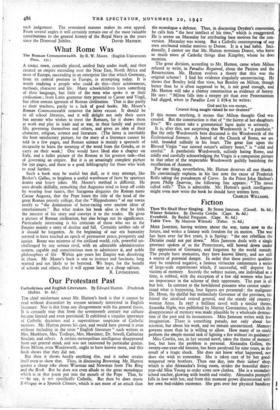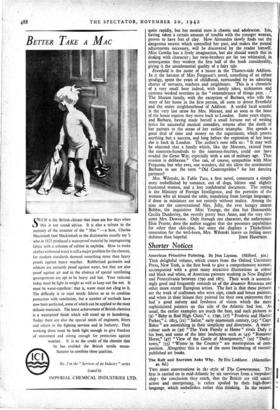Fiction
Then We Shall Hear Singing. By Storm Jameson. (Cassell. 8s. 6d.) Winter Solstice. By Dorothy Cowlin. (Cape. 8s. 6d.) Evenfield. By Rachel Ferguson. (Cape. 8s. 6d.) Table Two. By Marjorie Wilenski. (Faber. 7s. 6d.) MISS JAMESON, having written about the war, turns now to the future, and writes a fantasy with freedom for its motive. The war has been over for five years, it is Spring : " the one rebellion the Dictaior could not put down." Miss Jameson deals with a single province spoken of as the Protectorate, still bowed down under the oppression of Germany, and forgotten by the world outside. The people have memories, they have known liberty, and are still a source of potential danger. In order that these positive qualities may be rendered negative, a famous vivisector commences a series of large-scale experiments which, if successful, will deprive his victims of memory. Secretly the subject nation, one individual at a time, is robbed, with the exception of a few old women who have no importance in the scheme of their oppressors. The past is all but lost. In contrast to the bewildered peasants who cannot under- stand what is happening, four figures are presented: the malignant Dr. Hesse, the dutiful but melancholy Governor of the province, his friend the idealised retired general, and the sturdy old country- woman Anna. In 1937 a brilliant novel with a similar theme, Swastika Night, was published by Murray Constantine, in which the disappearance of memory was made plausible by a wholesale destruc- tion of the past and its monuments. Miss Jameson writes with less imagination. There is something pseudo, not only about her scientist, but about his work, and we remain unconvinced. Memory governs more than he is willing to allow. How many of us could perform the simple menial task of lighting a fire without its guidance?
Miss Cowlin, too, in her second novel, takes the theme of memory lost, but here the problem is personal. Alexandra Gollen, the twenty-one-year-old heroine, has been paralysed for nine years, as the result of a tragic shock. She does not know what happened, nor does she wish to remember. She is taken care of by her good- tempered twin brothers. Then one day, into their tailors' shop. which is also Alexandra's living room, strides the beautiful thirty- year-old Miss Young to order some new clothes. She is a secondary school teacher, glowing with health and vitality. Alexandra promptly falls in love with her, and from this moment grows discontented with her own bed-ridden existence. She gets over her physical handicap
quite rapidly, but her mental state is chaotic and adolescent. Iris, having taken a certain amount of trouble with the younger woman, proves to have feet of clay. How Alexandra slowly finds out the dangerous secrets which controlled her past, and makes the mental adjustments necessary, will be discovered by the reader himself. Miss Cowlin has a lively imagination, but she should watch this in dealing with character ; her twin-brothers are far too whimsical, in consequence they weaken the first half of the book considerably, giving it the unsubstantial quality of a fairy tale. Even field is the name of a house in the Thames-side Addison. In it the heroine of Miss Ferguson's novel, something of an infant prodigy, spent the years of childhood, surrounded by an admiring chorus of servants, teachers and neighbours. This is a chronicle of a very small beer indeed, with family jokes, nicknames and customs worked overtime in the " remembrance of things past. . ." The Morant family, with the exception of Barbara, who tells the story of her home in the first person, all seem to detest Evenfield and the entire neighbourhood of Addison. A sordid local scandal is the very last straw for Mrs. Morant, and as soon as the lease of the house expires they move back to London. Some years elapse, and Barbara, having made herself a small fortune out of writing lyrics for successful musical comedies, returns after the death of her parents to the scene of her earliest triumphs. She spends a great deal of time and money on the experiment, which proves anything but a success, and long before the expiration of her lease she is back in London. The author's note tells us: " It may well be objected that a family which, like- the Morants, existed from the nineteen-hundreds to the nineteen-fourties, could not have evaded the Great War, especially with a son of military age. That evasion is deliberate." One can, of course, sympathise with Miss Ferguson, but why ever, one wonders, did she allow the sentimenta Barbara to use the term " Old Contemptibles " for her dancing partners?
Mrs. Wilenski, in Table Two, a first novel, constructs a simple story embellished by romance, out of dogs, blitzes and slightly frustrated women, and a lost confidential document. The setting is the Ministry of Foreign Intelligence, and the portraits of the women who sit around the table, translating from foreign languages if done in miniature are not entirely without malice. Among the nine are the conversational Mrs. Jolly, the ever hungry moron Bobbie, the inquisitive Miss Younge, the dim but Honourable Cecilia Dunkerley, the sweetly pretty bore Anne, and the very tire some Mrs. Doweson. Only through one character, the unfortunate Elsie Pearne, does the author suggest that she possesses capabilities for other than chit-chat, but since she displays a Thirkellitish veneration for the well-born, Mrs. Wilenski leaves us feeling more



























 Previous page
Previous page